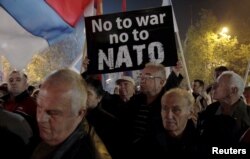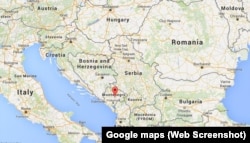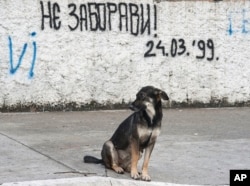Aspiring NATO member Montenegro is hardly a formidable military force. Its army has just 2,000 members, its four military jets are up for sale and its two operational warships hardly ever leave their home port.
Nonetheless, Montenegro is in the middle of a row between the West and Moscow over influence in the Balkans. The outcome of that clash could determine which way the western Balkan region is heading: toward the European Union, NATO and integration with the West, or back to Russia's embrace.
"It is clear that the East-West tensions have left consequences on the political and security situation in the western Balkans," former Prime Minister Milo Djukanovic said in a recent interview with The Associated Press.
He said that in the face of the "destructive" Russian influence in Montenegro, the West should "in the shortest period of time take a more determined course in defense of the European system of values."
Djukanovic's pro-Western stance made him the target of an alleged election-day coup attempt in Montenegro in October. The Kremlin's secret service operatives allegedly planned to kill him, topple his government and replace it with a puppet regime, all because of Montenegro's NATO bid — which Djukanovic had championed until he stepped down after the election.
Montenegro had been a faithful ally of Russia. But after splitting with Serbia in a 2006 referendum, the nation of 620,000 people took a strong turn toward Euro-Atlantic integration.
Russia strongly opposes the expansion of the Western military alliance in a region it considers part of its strategic sphere of interest. Wary of Russian influence in the still-volatile region, NATO wants Montenegro in the alliance.
Twenty-five of the alliance's 28 members have ratified Montenegro's membership. U.S. senators still haven't approved it, and there are fears in Montenegro and the region that President Donald Trump's new administration is too lenient toward Russian President Vladimir Putin.
Last week, Republican Senator John McCain of Arizona slammed his party colleague, Kentucky Senator Rand Paul, accusing him of "working for Vladimir Putin" after Paul blocked the passage of a treaty that would allow Montenegro to move forward with joining NATO.
In a letter to Senate Majority Leader Mitch McConnell of Kentucky, U.S. Secretary of State Rex Tillerson said "it is strongly in the interest of the United States that Montenegro's membership in NATO be ratified." The letter, dated March 7, was made available to the AP Wednesday.
"With Montenegro's accession, the alliance will create a contiguous border along the Adriatic coast," Tillerson said. "Since Montenegro borders five other Balkan nations, including NATO allies Croatia and Albania, its NATO membership will support greater integration, democratic reform, trade, security and stability with all of its neighbors."
The Kremlin has denied involvement in the alleged coup plot, but has openly campaigned against NATO in Montenegro and also in its neighbors, Serbia, Bosnia and Macedonia, and has supported pro-Moscow nationalist officials and groups in all those countries.
Andrija Mandic, a leader of Montenegro's opposition Democratic Front coalition, said Montenegro should never join NATO and should instead maintain close ties with its Slavic Orthodox "brothers" in Russia.
"We belong to a civilized circle that inherited the best traditions of Montenegro, which for 300 years had best relations, once with imperial Russia and later with the Soviet Union," Mandic told the AP.
Analysts say that behind all the tensions lurk major strategic goals.
For Russia, it is to have access to the deep-sea ports for its warships deployed in the Mediterranean and to maintain its economic and political interests; for NATO, it is to keep the Russian navy away from the so-called "warm seas." Montenegro is the only Adriatic state that is not yet a NATO member.
"Russia believes that the western Balkans partly is in its own sphere of influence," said Gennady Sysoev, the Balkan correspondent of the Russian daily newspaper Kommersant. "It is based on the fact that here, pro-Russian sentiments are quite strong."
"Amid its confrontation with the West, Russia feels that whoever is not with Russia is against Russia," he said.
Throughout history, Russia has viewed Montenegro as a close ally.
In recent years, Russia's rich and famous have been buying property along Montenegro's stunning coastline and opening businesses.
There's an entirely Russian-populated village on top of a mountain overlooking the spectacular Saint Stefan peninsula hotel resort, and Russian-language schools have sprung up for the growing Russian population. Russian billboards selling property line the winding road along the shoreline.
Montenegro remains deeply divided about NATO and other integrations with the West.
As a Serbian ally, Montenegro was bombed in 1999 by NATO, which launched airstrikes to stop a crackdown against Kosovo Albanian separatists. That made NATO highly unpopular in the predominantly Christian Orthodox countries.
"I am against NATO because I cannot forget the NATO bombs they tossed on us, here and in our brotherly Serbia," Stanko Lazarevic, a fisherman in Bigova, said as he prepared his nets.
Retiree Milorad Novakovic favors NATO membership but says it's important to maintain good relations with Russia.
"I don't see how Montenegro could jeopardize Russia by joining NATO," he said in the Montenegrin capital, Podgorica.







